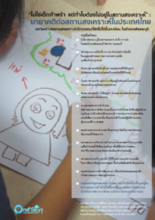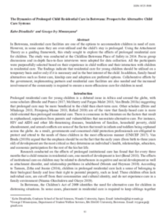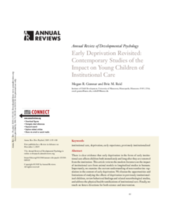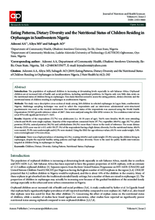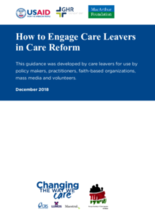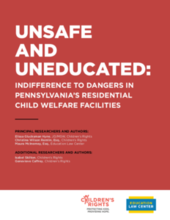Displaying 231 - 240 of 744
This summary report presents key findings and recommendations from an analysis of unregistered, private children's homes in Thailand's Sangkhlaburi District.
Using the Attachment Theory as a guiding framework, this study sought to explore the effects of prolonged residential care for children.
This field guide, produced by Apolitical in partnership with Hope and Homes for Children, is designed to help public servants understand the issue of children in care. It covers the following learning objectives: (1) Understand why experts say institutional care is harmful to children, (2) Learn about deinstitutionalisation and new approaches to replace institutions and prevent family separation, and (3) Learn about interventions that have improved outcomes for kids who do experience care.
This article reviews the modern literature on the impact of institutional care from animal models to longitudinal studies in humans.
This report from Lumos sets out the evidence about the harm that institutions can cause and presents the case for prioritising family and community-based alternatives to institutional care.
This study aimed to assess the eating patterns, dietary diversity and the nutritional status of children residing in orphanages in southwestern Nigeria.
A cross-sectional comparative descriptive study was conducted among 300 children of age 6-12 years from a pediatric outpatient department of a selected hospital and 300 children from selected orphanages in Kolkata to compare the prevalence of behavioral disorders in children under parental care and out of parental care using Strengths and Difficulties Questionnaire (SDQ).
This guidance was produced with the Kenya Society of Care Leavers to address how to best engage care leavers - who may have suffered personal trauma in their past and may not have an existing safety net to protect them, yet have a very important voice - in care reform.
This report is divided into two parts. Part A focuses on the dangers that occur at Pennsylvania’s residential facilities when the Pennsylvania Department of Human Services (“PA-DHS”) fails to provide meaningful oversight. Part B provides background on child residents’ educational rights, details the inferior education that children at these residential facilities receive, especially those children with disabilities, and the devastating consequences.
In this video, Dr. Kristen Cheney discusses how her work led her to study the growth of the Orphan Industrial Complex and its adverse effects on children, families, communities, and child protection systems.

